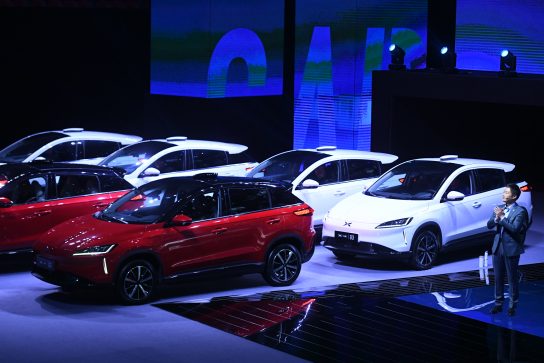November 14, 2019 Guangzhou-based electric vehicle maker Xpeng Motors announced Wednesday that it had raised $400 million from investors, including smartphone maker Xiaomi, and won "several billions" in Chinese yuan of unsecured credit lines from lenders including China Merchants Bank, China CITIC Bank, and HSBC.
It’s a rare show of confidence in a sector that has been hit hard by a nationwide slump in demand for cars, not to mention sharp reductions in government subsidies for electric ones.
Some history: China is the world’s largest auto market. In 2018, auto sales topped 28 million vehicles, compared to 17 million sold in the United States.
But this October, total vehicle sales in China declined for the 16th consecutive month, while sales of electric and hybrids cars tumbled to 75,000, down nearly half from a year earlier. Back in June, Beijing began scaling back subsidies for individual purchases of new energy vehicles.
Property conglomerate China Evergrande, which has spent nearly $2 billion on EV-related acquisitions, said Tuesday it plans to slow investment in electric vehicles. True, Chairman Hui Ka-yan, China’s third-richest person, vowed Evergrande will invest an additional $6 billion over the next three years to become China’s largest EV manufacturer and Tesla rival. But the company is scaling back the pace of that investment. It now says it will delay release of its first car until next June—a year later than planned.
Other Chinese EV makers are spinning their wheels:
• The current industry leader, Warren Buffet-backed BYD, has sold more than 185,000 vehicles so far this year. But BYD reported a 51% year-on-year decline in EV sales in September.
• Nio, whose founder styles himself as the “Elon Musk of China,” has burned through billions of dollars in venture funding and, despite a glitzy marketing campaign, reported a $1.4 billion loss last year, forcing the company to scrap plans to build a second factory in Shanghai.
• Nio’s share price, which surged to a high of $12 immediately following the company’s September 2018 debut on the NYSE, has since plummeted below $2.
And China’s EV makers will face added pressure from the real Elon Musk. Tesla’s new Shanghai Gigafactory, which broke ground in January, will start mass production within weeks. Musk expects the factory to produce 1,000 cars per month by year end, and eventually will ramp up to 12,000 cars per month.
So why would anyone bet on Xpeng Motor, a five year-old startup whose founder, 42-year old He Xiaopeng, also has no previous experience in auto manufacturing?
Well, for one thing, that founder—whom I interviewed in Guangzhou last Friday at the Fortune Global Tech Forum—has a pretty impressive track record. In 2014, he sold the popular mobile internet browser UCWeb to Alibaba Group for a cool $4 billion. He co-founded Xpeng Motor that same year and is now CEO.

(Chen Yihang/Visual China Group via Getty Images)
The venture unveiled its first car, an SUV with a starting price of around $20,000 after government subsidies, at CES in Las Vegas last year. It has since delivered about 12,000 vehicles to customers in China. In the spring, the company will roll out the P7, a four-door sedan with an advanced driver assistance system, automatic parking, and a range of 600 kilometers.
He told me his background as an Internet entrepreneur helped him see that consumers would interact with cars as mobile smart devices, much like how they do with their phones, especially as autonomous navigation and high-speed 5G networks become more popular. If so, he reasoned, big car manufacturers would eventually lose the upper hand to nimble upstarts who understood software, A.I., and how to analyze data.
“If we can survive in China for the next three to five years,” he said, “we believe we can become successful.”
I wouldn’t count him out.
Clay Chandler
On Twitter: @claychandler
Email: clay.chandler@fortune.com
This edition of Data Sheet was curated by Aaron Pressman.
No comments:
Post a Comment